
This learning area includes many social, environmental and cultural issues. The topics covered are often personal and require students to express their feelings, fears or insecurities. During these lessons boys are encouraged to listen to each other, share their own knowledge, not laugh at others, consider each other’s feelings, and learn more about themselves and their place in society. Many different topics are covered beginning with more personal ones such as “Me, Myself” and moving through the family into society. Students are taught to respect and care for one another and the environment (immediate and global). Through the teaching of this subject trust is developed within the peer group and between the students and their teachers. As such the Life Skills programme supports both the Literacy and Numeracy Programmes as it provides ample listening, reading and viewing, thinking and reasoning, speaking, writing, calculating and problem solving opportunities. Outings also form part of this programme and the boys together with their teachers visit places of interest and learning.
Areas of learning, which are covered under this title, are;
Social Sciences (History and Geography) where the students use enquiry skills to investigate the past and present historically – beginning with themselves and their family; study geographical and environmental concepts e.g. left, right, distance, size, weather, seasons.
Arts and Culture (Art, Drama, Music, Heritage, Culture – religion and identity) – through these lessons fine and gross motor skills are developed, rhythm is established, perceptual skills developed, expression learned, imagination explored, and interpersonal and intrapersonal skills are developed.
Natural Sciences enables the boys to act confidently on curiosity about natural phenomena, and to investigate relationships and solve problems for example watching a bean grow and recording the findings.
Life Orientation aims to empower students to use their talents to achieve their full physical, intellectual, personal, emotional and social potential. Through this area they develop the skills to relate positively and make a contribution to family, community and society. Our physical education programme contributes enormously here together with incidental teaching and other planned themes.
Technology introduces students to technological products in their surrounding world and during these lessons they investigate, design, make, evaluate and discuss (using Lego, paper, leather, card, tools for cutting or shaping) the things they might need e.g. a container to hold the popcorn they might have just made. These lessons encourage cooperative learning.
Economic and Management Sciences involves the student by assisting him to look at himself as a consumer, potential worker or entrepreneur. The Grade 1’s have a Trading Day which involves the boys having to present a business plan, make 10 items to sell, design a poster to advertise their product together with a presentation devised to encourage consumers to purchase their items, and then finally to set up a stall and sell their goods on a particular day. The Grade 2’s investigate some of the different jobs that people do and here parents might be encouraged to share their particular area of work and what it entails.
From the above it is obvious that Life Skills as a learning area impacts on the school day constantly from incidental teaching to carefully structured lessons.